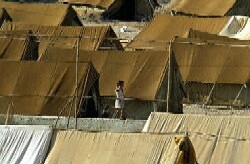IRIN 11 September 2003

A Palestinian girl runs among scores of tents at Haifa refugee camp in a suburb of Baghdad (Photo: AFP/File/Marwan Naamani)
When you are invited into Rasia Mohamed Hajazi’s living room, you take off your shoes and sit on the floor - of a tent provided by the United Nations High Commissioner for Refugees (UNHCR). “It is impossible to live in the tent - it is very hot,” 55 year-old Hajazi told IRIN.
Her family, along with more than 300 other families, an estimated 1,000 people, are living at “Haifa Club” a tent city set up on a football field in a small Palestinian area of the capital. Hajazi’s family was told to leave its plush rented home at gunpoint as the Saddam Hussein regime fell five months ago.
Under former president Hussein, Palestinians in Iraq were allowed to rent houses at very low prices. They had been living in apartments rented to them by the Ministry of Social Affairs for less than US $1 per week, which caused resentment among some Iraqis, who have to pay many times this amount in rent.
When US-led troops took over Iraq, home owners told their Palestinian tenants they had to move. Several months later, the Palestinian community say the conditions they are now forced to live in are terrible.
“There is no water in the tent, and there are not enough showers for all the people living here,” Hajazi complained. Her mother died in the tent: the stress and heat were too much for her, her daughter says. Crowded into the tent are two metal beds, a dresser, a television set, video player, stereo, and cases of sweets and cigarettes. In another tent, Hajazi has set up a small gas cooking burner. Family members sit on carpets on the floor when it’s time to eat.
UNHCR has plans to move the Palestinians into an empty apartment complex nearby. “We’re pushing for the CPA [the US-led Coalition Provisional Authority running Iraq] to give authorisation for these people to move into the nearby apartment buildings,” a UNHCR aid worker told IRIN in Baghdad. “But sooner or later, the government will want them back, so we’re trying to find a solution.”
Now, some people are getting desperate. They are worried about the oncoming winter, but they are also worried about catching infectious diseases from living in such close proximity to each other.
“They promised to find these people an empty building to live in. There must be a solution. Winter is coming,” Dr. Luma Almadi, aged 35, told IRIN. He works in the clinic next to the football field and also lives in one of the tents. “More families keep coming from other areas of Iraq, making the problem bigger,” Sadd Sehab Amed, a security guard at the camp, told IRIN.
“There’s not enough water for all of them,” Amed said. “We have too many families here.”
UNHCR and the Iraqi Red Crescent gave the families tents. UNHCR also provides electricity and built showers and toilets at the camp. The International Committee for the Red Cross (ICRC) built a water-piping system. The Muslim Hands NGO brought in additional water dispensers and a Norwegian church is giving medicine to the Palestinian clinic.
The April move in Iraq was the second time Hajazi had been forced out of her home. She was forced from Israel in 1948, and her family was taken in by the Iraq government. It’s estimated that some 5,000 Palestinians fled to Iraq at that time, the number has grown since to around 35,000, according to NGOs.
She said Palestinians got along fine with Iraqis, but now, no one would help them. They cannot return to Israel, she added.
Hajazi’s husband Ahmed Abdul Ibrahim reminisces about the US $10,000 he made as a shopkeeper selling sweets and cigarettes. Ibrahim has been warned that it’s too dangerous for him to re-open and looters have stolen almost all of the goods. “We will begin to work again and to have a life again, God willing,” Ibrahim hoped.
IRIN-Asia; tel: +92-51-2211451; fax: +92-51-2292918; email: IrinAsia@irin.org.pk
This Item is Delivered to the “Asia-English” Service of the UN’s IRIN humanitarian information unit, but may not necessarily reflect the views of the United Nations. For further information, free subscriptions, or to change your keywords, contact e-mail: IRIN@ocha.unon.org or Web: www.irinnews.org. If you re-print, copy, archive or re-post this item, please retain this credit and disclaimer. Reposting by commercial sites requires written IRIN permission.